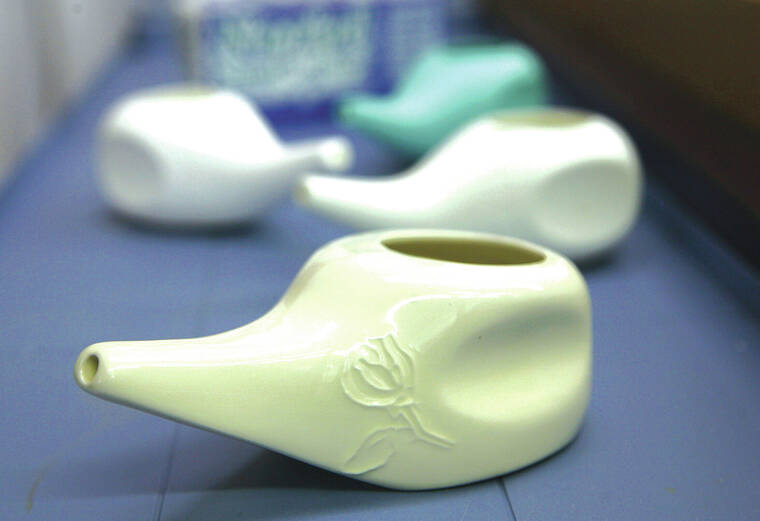Another dangerous amoeba has been linked to neti pots and nasal rinsing. Here’s what to know
NEW YORK — For years, scientists have known people who use neti pots can become infected with a brain-eating amoeba if they use the wrong kind of water. On Wednesday, researchers linked a second kind of deadly amoeba to nasal rinsing.
The Centers for Disease Control and Prevention published a report that for the first time connects Acanthamoeba infections to neti pots and other nasal rinsing devices.
Officials also renewed their warning that extremely rare, but potentially deadly, consequences can come from flushing nasal passages with common tap water.
What are neti pots?
Neti pots are one of the better known tools of nasal rinsing. They look like small teapots with long spouts, and usually are made of ceramic or plastic.
Users fill them with a saline solution, then pour the liquid in one nostril. It comes out the other, draining the nasal passage of allergens and other bothersome contaminants.
There also are other methods of rinsing nasal passages, including specially shaped cups and squeezable plastic bottles.
Why you shouldn’t use untreated tap water in neti pots
Tap water in the U.S. is treated to meet safe drinking standards, but low levels of microscopic organisms can still be found in it. It’s usually not a problem when people drink or cook with the water, but it can pose more of a danger when tap water is used for other purposes — like in humidifiers or for nasal irrigation.
CDC officials, citing a 2021 survey, say about one-third of U.S. adults incorrectly think tap water was free of bacteria and other microorganisms.
The CDC recommends using boiled, sterile or distilled water.
If tap water is used, it must be boiled for a minimum of one minute — or three minutes at higher elevations — before it is cooled and used, officials say.
Rare illnesses and nasal rinsing
More than a decade ago, health officials linked U.S. deaths from a brain-eating amoeba — named Naegleria fowleri — to nasal rinsing. More recently, they started to note nasal rinsing as a common theme in illnesses caused by another microscopic parasite, Acanthamoeba.
Acanthamoeba causes different kinds of illness but is still dangerous, with a 85% fatality rate in reported cases.
“These infections are very serious and even life threatening,” said Haston who was lead author of the report published in the journal Emerging Infectious Diseases.
The new study focused on 10 patients who fell ill between 1994 and 2022, three of whom died. Researchers say they can’t be sure how the patients were infected, but they noted several commonalities: All had weakened immune systems and practiced nasal rinsing.
Seven patients reported nasal rinsing for relief of chronic sinus infections, and at least two of them used neti pots. Two other patients did nasal rinsing as part of a cleansing ritual that is part of Indian tradition.


